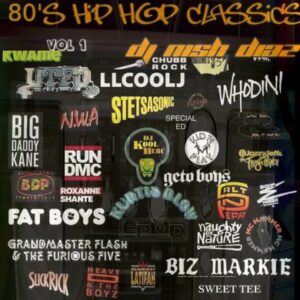Impact of 80s Hip-Hop: A Cultural Revolution
The 1980s marked the commercial formularization of hip-hop culture, a revolutionary movement that would forever change the landscape of music, art, and society. From the gritty streets of New York City to the global stage, 80s hip-hop laid the foundation for a cultural phenomenon that continues to resonate with audiences worldwide. Let’s delve into the key features and information that define the essence of 80s hip-hop:
Emergence of Hip-Hop Culture
The 1980s witnessed the birth of hip-hop culture as seen by the media and public at large , a multifaceted movement encompassing music, graffiti art, Breakin /B -Boying breakdancing, and DJing. Emerging from the urban neighborhoods of New York City, namely the Bronx. Hip-hop provided a voice for marginalized African American, Caribbean, Hispanic communities a platform for creative expression and social commentary.
Sampling and Production
At the heart of 80s hip-hop lay its innovative use of sampling. Producers and DJs drew inspiration from funk, soul, and disco records, manipulating samples to create new and unique beats. This era marked the golden age of sampling, as artists experimented with drum machines, synthesizers, and electronic instruments to push the boundaries of musical innovation.
Rap Pioneers
The 80s saw the rise of pioneering rap artists and groups who laid the groundwork for the genre’s sound and style. From Grandmaster Flash and the Furious Five to the Sugarhill Gang, Run-D.M.C., and Kurtis Blow, these trailblazers paved the way for future generations of hip-hop artists with their bold lyricism and innovative production techniques.
Lyricism and Storytelling
80s hip-hop lyrics often served as a reflection of urban life, addressing themes such as inequality, street life, partying, and self-expression. Artists used their lyrics as a powerful tool to share personal stories, shed light on social issues, and celebrate the vibrancy of inner-city culture.
Breakdancing and Fashion
The hip-hop culture of the 80s extended beyond music, encompassing vibrant forms of expression such as breakdancing. Dancers showcased impressive moves and routines, infusing the streets with energy and rhythm. The fashion of the era was characterized by oversized clothing, tracksuits, sneakers, and elements of streetwear, reflecting the dynamic spirit of hip-hop culture.
Cultural and Social Impact
Hip-hop music became a voice for marginalized communities, providing an outlet for expression and addressing social and political issues. Artists used their platform to challenge the status quo, confront systemic injustices, and advocate for change. Hip-hop culture transcended geographic boundaries, fostering a sense of unity and solidarity among diverse communities.
Public Enemy and Conscious Rap
Public Enemy emerged as torchbearers of conscious rap, using their music to confront issues such as racism, inequality, and activism. Their politically charged lyrics and unapologetic approach to social commentary resonated with audiences, sparking important conversations and inspiring a new generation of activists.
Commercial Success and Evolution
As the decade progressed, hip-hop gained commercial success and mainstream recognition. The genre’s influence extended beyond music, shaping fashion, art, dance, and language. 80s hip-hop laid the groundwork for the evolution of the genre, setting the stage for the diverse styles and sub-genres that would emerge in the years to come.
Influence on Pop Culture
The impact of 80s hip-hop reverberated throughout popular culture, influencing fashion trends, art movements, and linguistic expressions. From graffiti art to street fashion, hip-hop culture left an indelible mark on the zeitgeist of the era, shaping the cultural landscape for decades to come.
In conclusion, 80s hip-hop stands as a testament to the power of music and cultural expression. It served as a catalyst for social change, a beacon of creativity, and a source of empowerment for millions around the world. As we reflect on the legacy of 80s hip-hop, we celebrate its enduring influence and recognize its profound impact on the fabric of modern society.
